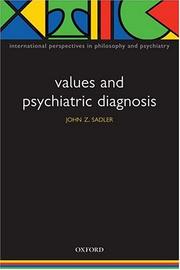| Listing 1 - 10 of 15 | << page >> |
Sort by
|

ISBN: 0801876834 9780801876837 9780801868405 0801868408 Year: 2002 Publisher: Baltimore : Johns Hopkins University Press,
Abstract | Keywords | Export | Availability | Bookmark
 Loading...
Loading...Choose an application
- Reference Manager
- EndNote
- RefWorks (Direct export to RefWorks)
"One of the best accounts of the intense debates on the values underlying the DSM, the need for accountability in psychiatric diagnosis, and some of the chief philosophical and political issues in psychiatry." -- New England Journal of Medicine.
Mental illness --- Madness --- Mental diseases --- Mental disorders --- Disabilities --- Psychology, Pathological --- Mental health --- Social aspects. --- Moral and ethical aspects. --- Diagnostic and statistical manual of mental disorders. --- DSM --- Mental Disorders --- Social Values. --- Classification --- Classification.

ISBN: 0198526377 9780198526377 Year: 2005 Publisher: Oxford : Oxford university press,
Abstract | Keywords | Export | Availability | Bookmark
 Loading...
Loading...Choose an application
- Reference Manager
- EndNote
- RefWorks (Direct export to RefWorks)
Ethics, Medical. --- Mental disorders --- Mental health personnel --- Mental illness --- Psychiatry --- Psychiatry. --- Social values. --- Values. --- Diagnosis. --- Philosophy. --- Diagnosis --- Moral and ethical aspects. --- Social aspects.

ISBN: 0801847702 Year: 1994 Publisher: Baltimore Johns Hopkins university press
Abstract | Keywords | Export | Availability | Bookmark
 Loading...
Loading...Choose an application
- Reference Manager
- EndNote
- RefWorks (Direct export to RefWorks)
Book
ISBN: 0198732368 0191750905 9780191750908 Year: 2014 Publisher: [New York, N.Y.] Oxford University Press
Abstract | Keywords | Export | Availability | Bookmark
 Loading...
Loading...Choose an application
- Reference Manager
- EndNote
- RefWorks (Direct export to RefWorks)
The Oxford Handbook of Psychiatric Ethics (the OHPE) examines ethical issues in twenty-first-century psychiatry and sets them in their social and political context. Key contextual developments for contemporary psychiatry include the rapid expansion of electronic communications, multiculturalism, new models of service delivery and new technologies, more oversight within stronger standards-based regulatory frameworks, and the emergence of more clinically embedded forms of practical ethics. These developments are reflected in the wide range and diversity of contributions to the OHPE. In addition to well-established areas of scholarship our contributors cover a variety of new and emerging topics: notable among these are peer support, co-production and other collaborative models of care, recovery, spiritual and religious aspects of psychiatry, non-European philosophy, and the emerging role of values-based practice. Diversity of content is further complemented by the diversity of perspectives represented by our contributors. Besides established figures in psychiatric ethics our authors include many new contributors to the field from disciplines representing both expertise-by-training (in areas ranging from philosophy to neuroscience) and expertise-by-experience as service users and/or as carers. The central importance of this latter perspective is reflected in our opening main section which brings together a small sample of the rapidly expanding expert voices from experience. We hope that read in conjunction with its sister volume, the Oxford Handbook of Philosophy and Psychiatry, and other books forthcoming in the series, the OHPE will contribute to the development of more collaborative models of service delivery as the basis of twenty-first-century mental health care.
Psychiatry --- Moral and ethical aspects. --- Medicine and psychology --- Mental health --- Psychology, Pathological --- Psychiatric ethics --- Mental health services ethics --- Medical ethics
Book
ISBN: 9780199663880 9780198732365 9780198732372 Year: 2015 Publisher: Oxford Oxford University Press
Abstract | Keywords | Export | Availability | Bookmark
 Loading...
Loading...Choose an application
- Reference Manager
- EndNote
- RefWorks (Direct export to RefWorks)
Psychiatrists have written much about the explosive expansion of scientific knowledge of the brain which developed over the late 20th century and the early 21st century. Comparatively little has been written within the field of psychiatry about the changes in society and world culture over this same period, and even less on the scope of psychiatric ethics that would account for these changes. Yet psychiatric ethics is an excellent framework in which to examine social changes in the field over the past 25 years, changes which are dramatic in nature and profound in impact.0Some of these social changes include multiculturalism and its associated diversity of values; the transition to the digital era with its new demands on confidentiality, clinical boundaries, and privacy; the empowerment of psychiatric service users as full participants and co-producers of care; the development of new technologies of assessment and treatment, varying in their invasiveness and risk; the recognition of expanded social roles for psychiatrists, and the associated virtues of psychiatric citizenship; and the development of new practice models, settings, participants, and oversight, all of which represent profound challenges and opportunities for the ethical practice of psychiatry. The 'Oxford Handbook of Psychiatric Ethics' is the most comprehensive treatment of the field in history.
Professional ethics. Deontology --- Psychiatry --- Medizinische Ethik. --- Psychiatric ethics. --- Psychiatrie. --- Psychische Störung. --- Ethics.
Digital
ISBN: 9780199663880 Year: 2015 Publisher: Oxford Oxford University Press
Abstract | Keywords | Export | Availability | Bookmark
 Loading...
Loading...Choose an application
- Reference Manager
- EndNote
- RefWorks (Direct export to RefWorks)
Book
Year: 2015 Publisher: Oxford : Oxford University Press,
Abstract | Keywords | Export | Availability | Bookmark
 Loading...
Loading...Choose an application
- Reference Manager
- EndNote
- RefWorks (Direct export to RefWorks)
Book
ISBN: 9780191799280 Year: 2014 Publisher: [New York, N.Y.] Oxford University Press
Abstract | Keywords | Export | Availability | Bookmark
 Loading...
Loading...Choose an application
- Reference Manager
- EndNote
- RefWorks (Direct export to RefWorks)
The Oxford Handbook of Psychiatric Ethics (the OHPE) examines ethical issues in twenty-first-century psychiatry and sets them in their social and political context. Key contextual developments for contemporary psychiatry include the rapid expansion of electronic communications, multiculturalism, new models of service delivery and new technologies, more oversight within stronger standards-based regulatory frameworks, and the emergence of more clinically embedded forms of practical ethics. These developments are reflected in the wide range and diversity of contributions to the OHPE. In addition to well-established areas of scholarship our contributors cover a variety of new and emerging topics: notable among these are peer support, co-production and other collaborative models of care, recovery, spiritual and religious aspects of psychiatry, non-European philosophy, and the emerging role of values-based practice. Diversity of content is further complemented by the diversity of perspectives represented by our contributors. Besides established figures in psychiatric ethics our authors include many new contributors to the field from disciplines representing both expertise-by-training (in areas ranging from philosophy to neuroscience) and expertise-by-experience as service users and/or as carers. The central importance of this latter perspective is reflected in our opening main section which brings together a small sample of the rapidly expanding expert voices from experience. We hope that read in conjunction with its sister volume, the Oxford Handbook of Philosophy and Psychiatry, and other books forthcoming in the series, the OHPE will contribute to the development of more collaborative models of service delivery as the basis of twenty-first-century mental health care.

ISBN: 0198526113 Year: 2004 Publisher: Oxford Oxford university press
Abstract | Keywords | Export | Availability | Bookmark
 Loading...
Loading...Choose an application
- Reference Manager
- EndNote
- RefWorks (Direct export to RefWorks)
Psychiatry --- Philosophy
Periodical
Year: 2014 Publisher: Oxford : Oxford University Press,
Abstract | Keywords | Export | Availability | Bookmark
 Loading...
Loading...Choose an application
- Reference Manager
- EndNote
- RefWorks (Direct export to RefWorks)
Psychiatrists have written much about the explosive expansion of scientific knowledge of the brain which developed over the late 20th century and the early 21st century. Comparatively little has been written within the field of psychiatry about the changes in society and world culture over this same period, and even less on the scope of psychiatric ethics that would account for these changes. Yet psychiatric ethics is an excellent framework in which to examine social changes in the field over the past 25 years, changes which are dramatic in nature and profound in impact. Some of these social changes include multiculturalism and its associated diversity of values; the transition to the digital era with its new demands on confidentiality, clinical boundaries, and privacy; the empowerment of psychiatric service users as full participants and co-producers of care; the development of new technologies of assessment and treatment, varying in their invasiveness and risk; the recognition of expanded social roles for psychiatrists, and the associated virtues of psychiatric citizenship; and the development of new practice models, settings, participants, and oversight, all of which represent profound challenges and opportunities for the ethical practice of psychiatry. The Oxford Handbook of Psychiatric Ethics is the most comprehensive treatment of the field in history. The volume is organized into ten sections which survey the scope of the text: (1) Introduction, (2) People Come First, (3) Specific Populations, (4) Philosophy and Psychiatric Ethics, (5) Religious Contexts of Psychiatric Ethics, (6) Social Contexts of Psychiatric Ethics, (7) Ethics in Psychiatric Citizenship and the Law, (8) Ethics of Psychiatric Research, (9) Ethics and Values in Psychiatric Assessment and Diagnosis, (10) Ethics and Values in Psychiatric Treatment. Written and edited by an international team of experts, this landmark book provides a powerful and important review of psychiatric ethics in the 21st Century.
| Listing 1 - 10 of 15 | << page >> |
Sort by
|

 Search
Search Feedback
Feedback About UniCat
About UniCat  Help
Help News
News